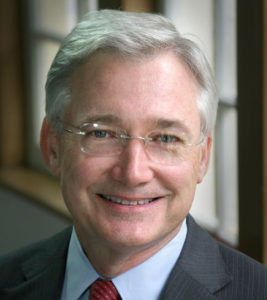The six Southern Baptist seminary presidents have condemned Critical Race Theory and forbade its use in seminary education. With this, they fell into lockstep with President Trump whose executive order forbade its use in federal agencies. He said Critical Race Theory is “un-American” and teaches people to “hate America.”
At issue is the long-debated question: Can America be both virtuous and flawed? From our beginnings there has been a tension between what historian Arthur Schlesinger calls “messianism” and “realism.”

Stephen Shoemaker
We see messianism in the idea of America as an “elect nation,” a “redeemer nation,” the “New Israel.” This view says God has chosen America for a unique mission in human history. Could such a nation be deeply flawed by racism? Others spoke of the “American Adam,” America as a New Adam. Thomas Paine, the Enlightenment deist, wrote in Common Sense: “We have it in our power to begin the world again.” President Reagan used to love to use his words, but conservative writer George Will commented that we “can scarcely imagine a less conservative notion.”
Most of our Founders, however, had a more “realistic,” more sober analysis of human nature and resisted these “messianic” visions of America. The corruptibility of human nature required many checks and balances in our Constitution. John Adams wrote in the 1780s that there was “no special providence for Americans, and their nature was the same as that of others.” America might be a light to the nations, but its light was not divinely pure. We were cut from the same cloth as other nations and peoples.
So now we come to Critical Race Theory in this day of racial reckoning. It examines our history of systemic racism and racial inequity and its legacy of grievous harm to people of color even and especially to this day. It punctures the false innocence of American self-understanding. Paul exhorted us to hate what is evil and to love that which is good. I think it possible for Christians to hate what has been evil in our history and also love what is good.
“It possible for Christians to hate what has been evil in our history and also love what is good.”
It has been said that slavery/racism is America’s original sin. It has been with us for 400 years. The supremacy of the white race was bred in the bones of most Americans, so we could declare in the Declaration of Independence that “all men are created equal” and at the same time own slaves. It would take until the Civil War to end slavery and another 100 years to end our unconscionable Jim Crow laws.
It is strange that conservative evangelicals steeped in the doctrine of original sin have difficulty applying it to their nation and denying the reality in systemic sin and systemic racism. They focus so on personal sin and on personal regeneration as the solution to our social ills that they miss this meaning of original sin. But the Bible is replete with examples of the acknowledgment of systemic sin. “The fathers eat sour grapes, and their children’s teeth are set on edge.” The consequences of sin can be passed down to multiple generations. Part of what is “evil in God’s sight” includes the “iniquitous decrees” of nations.
So maybe we need a new look at the doctrine of original sin. We need not follow Augustine’s take on it. It means sin is pervasive and ongoing. It comes early and stays late. It infects not only the human heart but also social structures and nations. We are born in the goodness of God, but we all have our better angels and our darker ones, to use the Jewish way of understanding, our yetzer hatov, our good impulse, and our yetzer hara, our evil impulse.
“America’s beauty is a tangled beauty.”
A sober view of our human nature and of our nation lets us hate what is evil in it and love what is good. America’s beauty is a tangled beauty. William Sloane Coffin once wrote: “There are three kinds of patriots, two bad and one good. The bad are uncritical lovers and loveless critics. Good patriots carry on a lover’s quarrel with their country.”
The beloved national song points us there: “O beautiful for spacious skies … for pilgrim feet … for heroes proved … for patriot dream.” Then the refrain: “America, America, God mend thine every flaw; confirm thy soul in self-control, thy liberty in law.”
Stephen Shoemaker is pastor of Grace Baptist Church in Statesville, N.C. He served previously as pastor of Myers Park Baptist in Charlotte, N.C.; Broadway Baptist in Fort Worth, Texas, and Crescent Hill Baptist in Louisville, Ky.
Related articles:
SBC seminary presidents are ‘complicit with evil,’ revered California pastor says
SBC seminary presidents are propagating fear to maintain control | Laura Levens
Is it time for Black Christians to give up on the SBC? | Corrie Shull
How I learned to name my oppression — and my privilege | Meredith Stone


